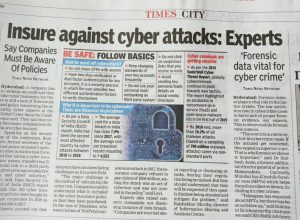Amrita Didyala| TNN | Dec 15, 2017, 07:38 IST
HYDERABAD: Anything ‘smart’ is hackable and anything connected can be remotely hackable, was the message spelt loud and clear by experts at the two day International Cyber Security Conference-2017 on Thursday.
And, if connected, devices like your smart-camera fitted television isn’t enough, future attacks can be launched directly from human brains with a future attacker launching a highly-sophisticated attack by just thinking of a strike and artificial intelligence carrying it out.
“Brain computing operations, which uses intelligent technologies like machine learning and natural language processing to mimic the way the human brain functions, is something that a handful of companies are researching. The future attacks can even be through brain computing operations,” pointed out Colonel Daniel Noy (Retd), senior director for CERT projects, Rafael Advanced Defense Systems Limited. Some experts say the camera of a smart TV may be vulnerable to attackers spying on a person’s homes by hacking into the TV set.

“India needs to scale up the development and train more people to check for cyber security. Not just IT professionals but there can be several other roles like analyst, forensic and crisis officers,” said Levi.
Speaking to TOI, Levi said all generations need to be educated about cyber risks. “India should provide training in open schools about ethical hacking and audit the cyber security. This will also increase the employment in the country. The people who are still unaware of the technology need to be educated,” he added.
According to Levi, more companies should invest in cyber security and it should be regulated. “No company will spend extra on cyber security, unless its regulated. If there is regulation, the companies will get cyber experts and analysts to check the risks,” said Levi. The Israeli government provides 6 % to 8% of the information technology budget for cyber security, he said.
Eli Zilberman Caspi of Israeli cyber security consultancy firm Konfidas says, “It’s like a tsunami coming in” but no one is taking notice of the danger.
“Its magnitude is misunderstood. It is quite a task to identify the data asset (that falls under the regulation space) and assess what part of it is private data. Making every employee in an organisation aware of the requirements is important,” he told BusinessLine.
Caspi was here to attend a two-day international conference on cyber security.
“It is the responsibility of firms that do business in the EU to ensure that the companies they engage in executing the business comply with the norms. If you are not complaint, you could face harsh fines,” he said.
***
Voter & PAN database too not fortified from hackers
HYDERABAD: Hackers can easily access your voter or PAN data and get away. Even if they are caught, they will get a three-year jail term. Reason: Crucial ‘critical’ cyber infrastructure is yet to be notified by government/independent entities under the Information Technology (IT) Act.




Read more from the speakers of Cyber Security Conference, Eli Zilberman and Ram Levi about GDPR regulations during the Conference was held in 2017.
Sources: https://timesofindia.indiatimes.com/city/hyderabad/smart-connected-device-is-sitting-duck-for-hackers/articleshow/62077276.cms
https://timesofindia.indiatimes.com/city/hyderabad/voter-pan-database-too-not-fortified-from-hackers/articleshow/62077559.cms



